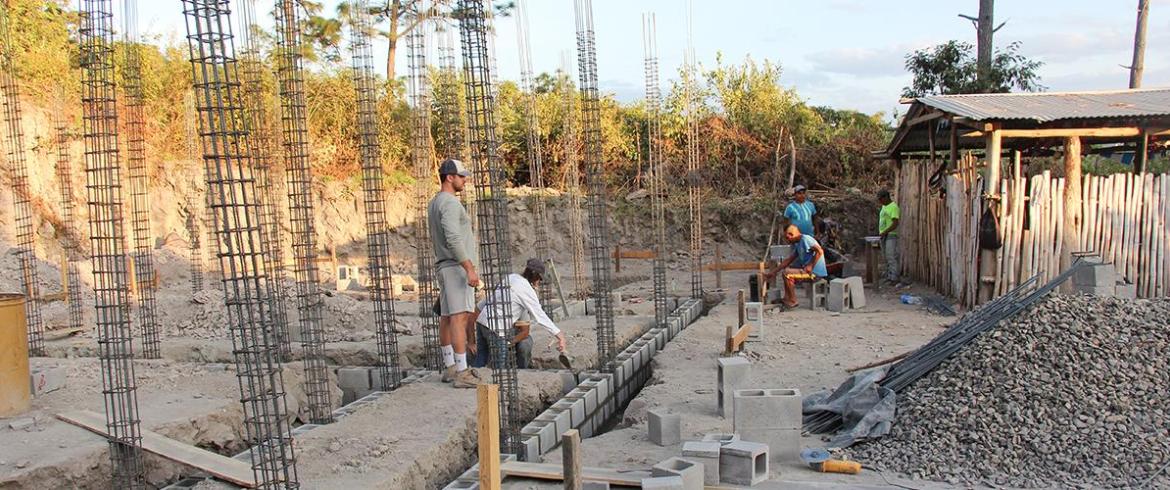
Raphael Kampmann and a group of students with FAMU-FSU Engineers without Borders (EWB) just returned from their second trip to Guatemala where they are helping with the design and construction of a school house for a local community. Kampmann is a professor of civil and environmental engineering at the college, and volunteers as a faculty advisor for FAMU-FSU EWB.
The students are all members of a collegiate chapter of EWB, a non-profit organization dedicated to helping communities with basic human needs of water, food and shelter. On the first trip, two years ago, the EWB students and their advisor went to central Guatemala for an assessment trip, traveling to the remote community of Cantun II. The small rural community desperately needed a school house for the children. The village had been using a makeshift building held together with bamboo and tarp as their school. The structure leaked badly and there was no place for the children to go to the bathroom or wash their hands.
Two alumni, Theodore Thomas and Jena Martino were civil and environmental engineering students at the time. They joined Kampmann for the initial trip to the area and worked with local engineers and EWB Guatemala to obtain topographic data, soil properties, and information about locally available materials. Based on their findings, the team drew up plans that were suitable for the area. They set the design phase up as a senior design project with the college and made recommendations that successfully met the needs of the community. The students had to fund 95 percent of the project themselves with an estimated cost of $50,000. The plans involved a structure with two rooms, a kitchen/office, a bathroom and washing station.
According to Kampmann, the initial visit was much more than an engineering project. It was about a deep connection with the community.
“It’s all about trust,” Kampmann said. “When we travel to a remote village to work with a community, the level of trust between the community and our group is the most important aspect. Our students are great at that because of their multicultural backgrounds. They listened a lot and did not impose their point of view or present specific solutions. Instead, they worked and engaged with the community to show the local people they are there to help.”
Taylor Bethmann got a chance to work on the site in Guatemala and was part of the team who delivered the finished plans to the community on the second visit. Bethmann is a mechanical engineering student and president of the student chapter of EWB.
“We take so many things for granted—turning on the faucet to get water or having a working toilet,” Bethmann said. “Students have a chance in EWB to really make a difference. EWB provides opportunities for students to travel and give back to society in an impactful way.”
While there, Bethmann’s team got to break ground at the site and help lay out the foundation for the project.
Bryant Rodriguez, an electrical and computer engineering student at the college and went with the second group.
”My biggest surprise was the hospitality of the people,” Rodriguez said. “There were lots of kids there and they seemed really happy to have us. We played games with the kids and a smile went a long way. It is surprising how well the communication went, even with the language difference.”
When EWB works with a community they usually establish a relationship for a minimum of five years. The impact on a community is greater because the framework is established, and relationships are forged. Once the school house is complete, EWB hopes to begin a water treatment or vehicle bridge project for the area. The group also wants to work on some humanitarian projects in the U.S. in areas near the college.
”Not everyone can travel abroad,” Kampmann said. ” Some of our students want to help locally. Many communities in our area were effected by Hurricane Michael and we hope to reach out to those communities too.”
The students from the FAMU-FSU College of Engineering have the opportunity to study with peers from all over the world. The college has a multicultural population and students are dealing with people from different backgrounds.
“It is often difficult to step away from your own world and your comfort zone to communicate with people from another place, but our students seem to be very prepared for that,” he said.
”They really listened to the individuals in the community. They listen and understand the problem, before they solve it or before they give their opinion. This makes a huge difference when approaching an engineering challenge. Our students understand that critical aspect.”
